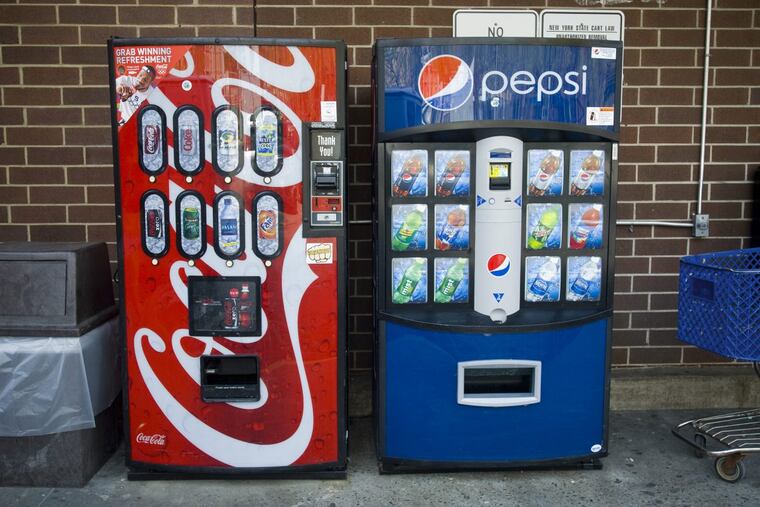Another take on soda tax: Businesses not hurt by levy
Despite a 57 percent decline in beverage sales since Philadelphia's tax on soda and sweetened drinks began, researchers found that overall store sales have not suffered.

Sales of soda and other sweetened beverages in Philadelphia have dropped significantly — by 57 percent in volume — since the city's new beverage tax went into effect in January, according to researchers.
But despite that decline, overall sales at chain stores in Philadelphia have not suffered due to the tax, said Sara Bleich, a professor of public health policy at the Harvard T.H. Chan School of Public Health.
Bleich on Wednesday presented the findings of a team from Harvard, Pennsylvania, and Johns Hopkins Universities, based on the first six months that Philadelphia's tax on sweetened beverages was in effect.
"Declines in beverage sales don't appear to be impacting total store sales in Philadelphia," Bleich said in a telephone interview after her presentation at a conference in Washington D.C. on obesity.
The study, touted by Mayor Kenney's administration as the first to take a hard scientific look at the tax's effects, was funded by Bloomberg Philanthropies. Former New York City Mayor Michael Bloomberg has poured millions of dollars into supporting taxes on soda across the country as a means of fighting obesity.
Bleich's presentation marked the latest in a stream of studies about the controversial and closely watched 1.5-cents-per-ounce tax on sweetened beverages. Philadelphia became the first big city to implement such a levy in January, other cities have followed, and more are watching as the beverage industry continues to fight the tax. Both sides also are waiting to hear whether the Pennsylvania Supreme Court will consider Philadelphia's tax.
Bleich is one of the researchers participating in the multi-university, three-year study about the tax. Researchers are comparing sales in Philadelphia at both chain retailers and independent stores to sales in Baltimore, which does not have a tax on sweetened beverages.
Bleich said other top findings from the first six months of data included:
Independent retailers passed through 100 percent of the cost of the tax to consumers, while chain stores passed on 75 percent. (Philadelphia's tax is levied on distributors, many of whom have passed it along to retailers. Retailers in turn have passed much of it along to consumers.)
Dollar sales of taxed beverages dropped 46 percent at chain stores in Philadelphia in the first six months of the tax compared with Baltimore.
While there have been significant drops in store sales in Philadelphia since 2014, researchers said the new tax does not appear to have intensified that decline. The difference in total store sales in Philadelphia before and after the tax, as compared with Baltimore, is "no different than zero," Bleich said.
The Kenney administration found the study's conclusions encouraging.
"This is very positive news both for public health and for the economic health of our stores," said Mike Dunn, a city spokesman. "It shows that people are drinking fewer sweetened beverages, which is great for their health. At the same time, overall store sales are not impacted by the tax, which is great news for local retail businesses."
Other studies — including some funded by the American Beverage Association, which opposes the levy — have also found declines in beverage sales in Philadelphia since the tax began in January.
But Anthony Campisi, a spokesman for the Ax the Beverage Tax Campaign, cast doubt on the study because it was funded by Bloomberg. He also said it understated the impacts on businesses.
"Our own analysis of independent market research data over a similar period found total store sales in Philadelphia supermarkets down nearly 10 percent," Campisi said. "Supermarkets are seeing declines in sales of yogurt, soup and rice because families are driving to the suburbs to do their shopping. This tax has been an economic boom for nearby suburban towns and an economic disaster for Philadelphia neighborhoods."
Store owners also have been outspoken against the tax. Jeff Brown, who owns several Philadelphia ShopRite stores, testified at a state Senate hearing last month that his store profits have dropped by 15 percent.
Philadelphia's tax raised about $60 million in its first nine months. Revenue from the tax was $7.4 million in September, marking the highest monthly collection to date and the closest the city has come to hitting its $7.7 million monthly average collection needed to raise its projected revenue. The tax revenue will pay for pre-K, community schools, and improvements to the city's parks, libraries, and recreation centers.
For the study, researchers are examining sales at 60 independent stores in Philadelphia and 60 independent stores in counties surrounding Philadelphia, as well as stores in Baltimore. To analyze chain store sales, Bleich said, the researchers purchased data from IRI, a market research company that tracks store sales. The IRI gave researchers data from 687 chain stores. The research will also include bag checks with individual shoppers as they leave stores, to better understand individual shopper behavior, as well as interviews with store owners and beverage distributors.
This article has been updated to clarify that the percent change researchers found in volume and dollar sales of taxed beverages was only at chain stores in Philadelphia.